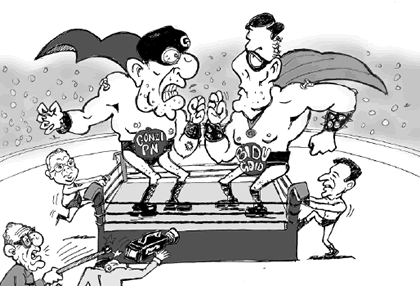
| EDITORIAL | Sunday, 02 March 2008 It is all a matter of trust
As the parties fight a pitched battle in “all out war” mode over the election, the scaremongering, negative campaigning and issuing of libels are destined to carry on increasing and to dominate the political agenda in the crucial five remaining days. The levels of misinformation, mutual accusations and denials on educational “retention” or “repeater” classes and the free or subject to payment health service have only served to further confuse the electorate.
The level of debate is descending to an all-time low, far removed from a sober and an informed debate we hoped for. This newspaper, in consonance with its editorial policy, has made it a point of presenting an informed opinion to our readers whereby all shades of political opinion have been given prominence, all parties have been probed and all party leaders have been grilled. We have done this in the belief that our readers should freely decide in whose hands they would like to place their destiny and the future direction of our country. In the final analysis, when the cookie crumbles, only Lawrence Gonzi or Alfred Sant can be elected Prime Minister. Essentially this is a two-way fight to a tight finish, as evidenced by our opinion poll of today. We believe that in exercising his/her sovereign right to elect a government, the electorate will consider the record and achievements together with shortcomings of the parties and its leaders; the policies presented by the parties; their respective political programmes and the trust factor enjoyed by the leaders. By weighing up these factors, the electorate will be in a better position to decide. Past records of both party leaders should be examined in depth and dispassionately. Accordingly, Alfred Sant’s achievements and failures in his stint as Prime Minister should be analysed and compared with the record and failures of Lawrence Gonzi, during the last four years. The records, including the achievements and failures of Nationalist governments since 1987, are also to be factored in. After all on taking over the helm of the country Lawrence Gonzi inherited both the achievements and the shortcomings of the previous administration. A number of pertinent questions addressing relating to the bread and butter issues, which are of concern of the electorate, also needs to be addressed. Who of the two has the better policies to guarantee a better education? A guaranteed free health service? Management of the economy? Fight against corruption? Sustainable environment? Responsible fiscal policy? And most of all: management of the European project? Equally important is that attention is given to the respective programmes of the parties. After all, the manifesto commits the parties to a line of political action. Two essential components are essential in politics, numbers to govern and ideas, many of which should be included in ones political programme, presented to the electorate for its approval. These include promises, targets and priorities for the incoming government, which give a political line of action expected to be honoured. Trust is also a crucial component, and readers may also wish to decide whom of the two party leaders they trust more to pilot the country in the next five years. There is another aspect which cannot be ignored. That the right for the voter to choose other political formations, namely Alternattiva Demokratika and Azzjoni Nazzjonali. Even though the electoral system does not favour small parties, the undeniable and sovereign right of the voter should be respected. Whoever wins the administration of the country can brace himself to tackle looming problems on the horizon, including: an increasingly volatile global economy; pressures to fulfil electoral promises; a growing local demand to introduce further civil rights and recognition of diverse lifestyles; citizen protests in favour of sustainable development; a pensions time bomb; an unsustainable public health service; pressures to improve public transport, European pressure to further liberalise our economy and to run a tight fiscal policy; calls for increased accountability and transparency of public administration and from government entities. In the final analysis, when push comes to shove, the electorate is faced with one daunting question: who of the two party leaders is best suited to navigate the ship of state in the looming turbulent waters? Any comments?
|
MaltaToday News |
Copyright © MediaToday Co. Ltd, Vjal ir-Rihan, San Gwann SGN 9016, Malta, Europe
Managing editor Saviour Balzan | Tel. ++356 21382741 | Fax: ++356 21385075 | Email
Managing editor Saviour Balzan | Tel. ++356 21382741 | Fax: ++356 21385075 | Email
